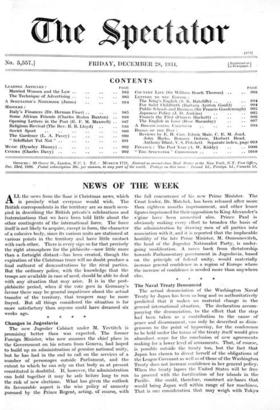Changeg in Jugoslavia The new Jugoslav Cabinet under M. Yevtitch
is promising better than was expected. The former Foreign Minister, who now assumes the chief place in the Government on his return from Geneva, had hoped to build up an administration of genuine national unity, but he has had in the end to call on the services of a number of personages outside Parliament, and the extent to which he can rely on that body as at present constituted is doubtful. If, however, the administration can hold together it may be safe before long to run the risk of new elections. What has given the outlook its favourable aspect is the wise policy of amnesty pursued by the Prince Regent, acting, of course, with the full concurrence of his new Prime Minister. The Croat leader, Dr. Matchek, has been released after more than eighteen months imprisonment, and other lesser figures imprisoned for their opposition to King Alexander's r4ime have been amnestied also. Prince Paul is obviously making every effort to broaden the basis of the administration by drawing men of all parties into association with it, and it is reported that the implacable hostility of the late Prime Minister, M. Ouzounovitch, the head of the Jugoslav Nationalist Party, is under- going modification. A move back from dictatorship towards Parliamentary government in Jugoslavia, based on the principle of federal unity, would materially increase general confidence in a region of Europe where the increase of confidence is needed more than anywhere else.
* * * *


































